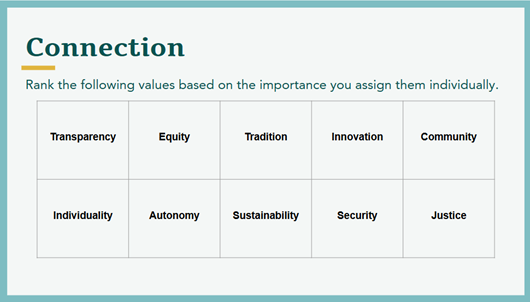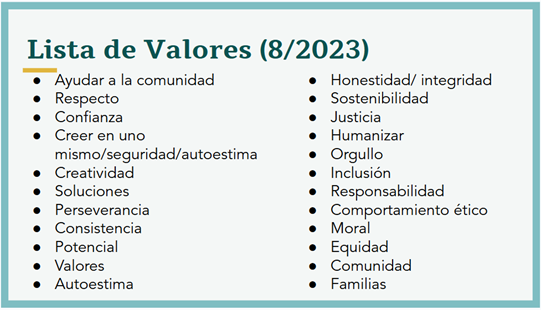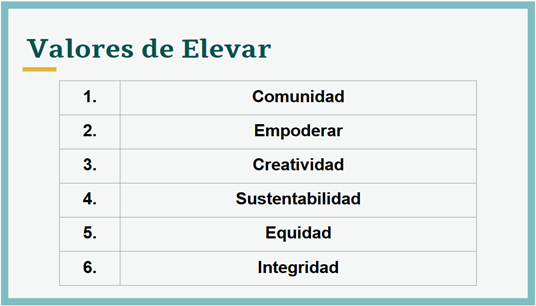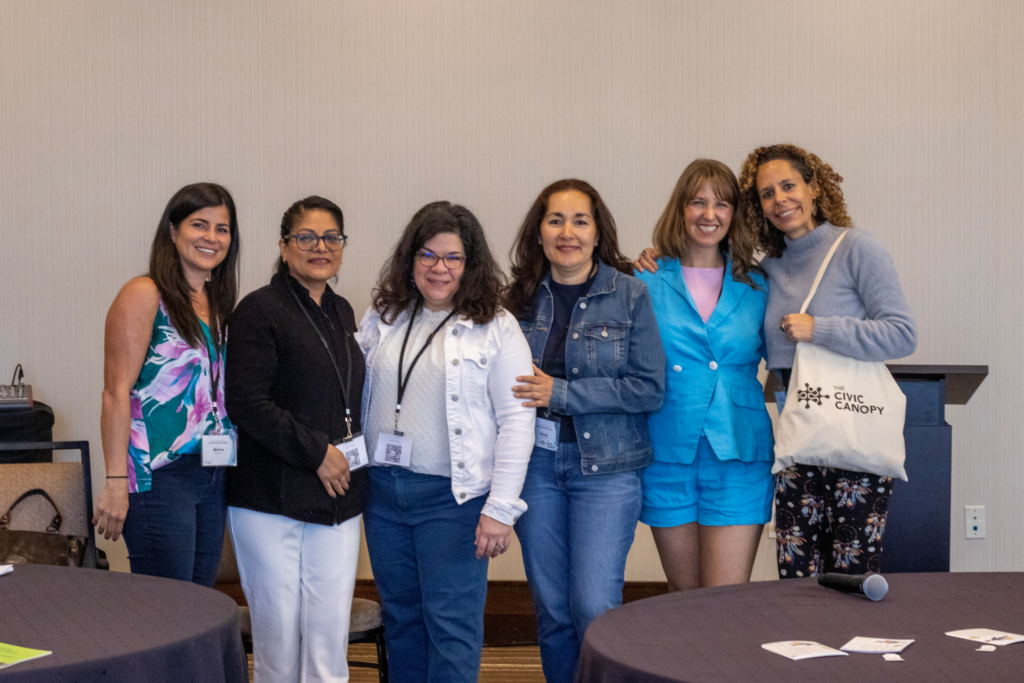Pictured above: Members of Elevar’s Steering Committee alongside Eagle Valley Community Foundation Staff at the 2024 Civic Canopy Summit – Catalyzing Culture Change.
It takes vision and conviction to challenge the current funding and grantmaking dynamics in our communities. In our work, we often hear how funding favors traditional forms of operating—preferencing established efforts over emerging ideas. At the same time, we have also noticed a growing push for revolutionizing philanthropic systems to center community-driven efforts and increase grantee capacity (see for example Food Justice Funders Collaborative: Getting Going). One organization that has been doing such capacity-building work is Eagle Valley Community Foundation (EVCF) through their program Elevar. As an emergent program that challenges current models of philanthropic funding, the Elevar steering committee found itself needing to establish a core set of values, practices, and decision-making processes that would instill equity not just in the results it seeks, but also in how the results are achieved. This case study will focus on how The Civic Canopy supported Elevar in establishing a culture of collaboration by deciding upon a list of shared values, utilizing a collaborative form of decision-making, and remaining as a consistent thought partner throughout Elevar’s growth and development. Staff lead Virginia Lecea shared:
“Civic Canopy has been critical in the launch and design of Elevar…[provoking] critical thinking when brainstorming on how the program was going to look like, and once launched, Civic Canopy helped us through some deep activities as Mission, Vision and Values creation, identifying our purpose, ways to vote on ideas and be inclusive, and through the design of a thorough application process.”
The Civic Canopy first learned about Elevar through a thought-partnership relationship between EVCF Executive Director, Melina Valsecia, and our recently retired colleague, Alice Pugh. In conversation, Melina expressed the growing need to grow the presence of people of color in leadership positions across Eagle County. This seed would then grow to become what Elevar is today. In their own words, Elevar seeks to:
…collectively build a community that embraces diversity, honors inclusivity, and actively works to change the systems that prevent communities of color from having a voice and leadership roles across all aspects of society. We will listen, learn and collaborate to activate community power, create space for community voice, and give the communities we serve an opportunity to create and implement ideas with, by and for communities of color throughout Eagle County.”
Under the leadership of Melina Valsecia, Virginia Lecea, Julieta Cavallo, Erin Janklow, and a steering committee of local Latine leaders and entrepreneurs, Elevar focuses on supporting the development, consolidation, and inclusion of People of Color in Eagle County’s leadership landscape. More specifically, Elevar identifies emerging leaders across business and non-profit sectors and boosts their capacity through grant funding, mentorship, and opportunities to gain experience in leadership by joining its steering committee once their mentorship course concludes.
The Civic Canopy has provided varied forms of support throughout the different stages of Elevar’s development as a program. Most recently, we supported Steering Committee members in developing a shared set of values to serve as the North Star of their decision-making processes. To do this, we conducted a values assessment exercise using the following slide.

As a recently established program, it was important for the members of Elevar to have a shared understanding not only of how they were going to operate but also of the why of their actions and decisions. The values assessment above allowed for Steering Committee members to connect with one another and talk about how they would rank the values displayed, their interpretation of each value, and compare their value orientations with each other. This exercise is particularly effective at presenting values not as positive or negative, better or worse, but at allowing people to express how they each live their values and why they hold such importance to them. It also circumvents the usual trap of diving right into trying to convince our collaborators that our value rankings are the “right” ones.
Steering committee members brainstormed the following list of values weeks earlier, and were looking to decide on the top six that would serve as their North Star:

Having gained an understanding of fellow members’ value orientations, the group went on to use an N/3 process to prioritize through their previously brainstormed list of values. N/3 is a prioritization process where “N” stands for the number of options we have available to prioritize from, which then gets divided by 3 and results in the total number of votes each person is allocated. In this case, the first round provided members with 7 votes, rounding down from the twenty-three available options. The process was then repeated until the following list of values was decided upon:

Executive Director, Melina Valsecia reflected on the process, “Canopy’s expertise and collaborative approach have empowered us to envision and articulate the long-term outcomes of Elevar with clarity and confidence… we are not only laying a strong foundation for immediate success but also ensuring that Elevar will have a sustained and meaningful impact on our community for years to come.”
Coming up with the list of shared values was the first task. Once completed, Steering Committee members had to decide how they were going to make it official. This entailed sorting through different decision-making processes and deciding how to decide. While we at The Civic Canopy encourage our partners to engage in highly collaborative practices, we also understand that not every decision has to be made by consensus. This is why we use tools such as Fist-to-Five, which allow individual group members to express their level of comfort with a decision.
Fist-to-Five is also able to accommodate decisions at both the consensus and consent levels which, while similar, are not the same. Learn more about the Fist-to-Five voting method.
Deciding how to decide can be challenging, especially for groups like Elevar that strive to be inclusive of all perspectives. Folks can get tangled in a web of presumptions, e.g., “Why does this person get to decide on X?,” or, “Why is my opinion not being taken into account on Y decision?” To prevent this from happening, we recommend walking up and down the decision-making ladder:
Factors that influence what decision-making style should be used at a specific time depend on several factors including how much ownership group members are asking for, who is impacted, how many people are involved, the level of urgency for the decision to be made, and the presence of diverging opinions. All things considered, groups should be open and transparent about the decision-making process they will be engaging in at different times, providing reasoning to limit assumptions and potential resentment from their members. Consensus, for example, provides a high level of collective ownership for a decision but can often take the longest to achieve. Independent decision-making, on the other hand, can be done very quickly but offers the least amount of collective ownership.
Elevar’s Steering Committee decided to use a Fist-to-Five method to gain consensus on the shared list of values since it would serve as everyone’s North Star throughout their engagement in the program. The list was incorporated through full consensus with buy-in from every member. A culture of collaboration was palpable throughout this process. Members embodied multiple elements of the Community Learning Model for successful collaboration as they were thoughtful of including every perspective in the room, engaging in generative dialogue, and acting upon their . After the process, staff lead Erin Janklow said:
“Civic Canopy and Jesús have been an invaluable resource to Elevar. This newest pillar of our Community Foundation has been built with extra assurance that we are following best practices from the start. From guiding the management of the program to envisioning its larger guiding principles, we are so fortunate to have brilliant humans to brainstorm with and learn from.”
Elevar stands as a leading role model for community-informed grantmaking in Colorado. Composing a grantmaking body in the Steering Committee from those in the community who experience the reality of living in Eagle County every day—and going the extra mile in developing not only their capacity to join other decision-making bodies but also capacitating them as mentors for their fellow community members and new generations. We at The Civic Canopy are honored to support, stand by, and continue to serve as thought partners for this effort. More recently, Jesús and Bill have been able to connect with their team as they begin the rollout of the program’s mentorship arm for grantees.


